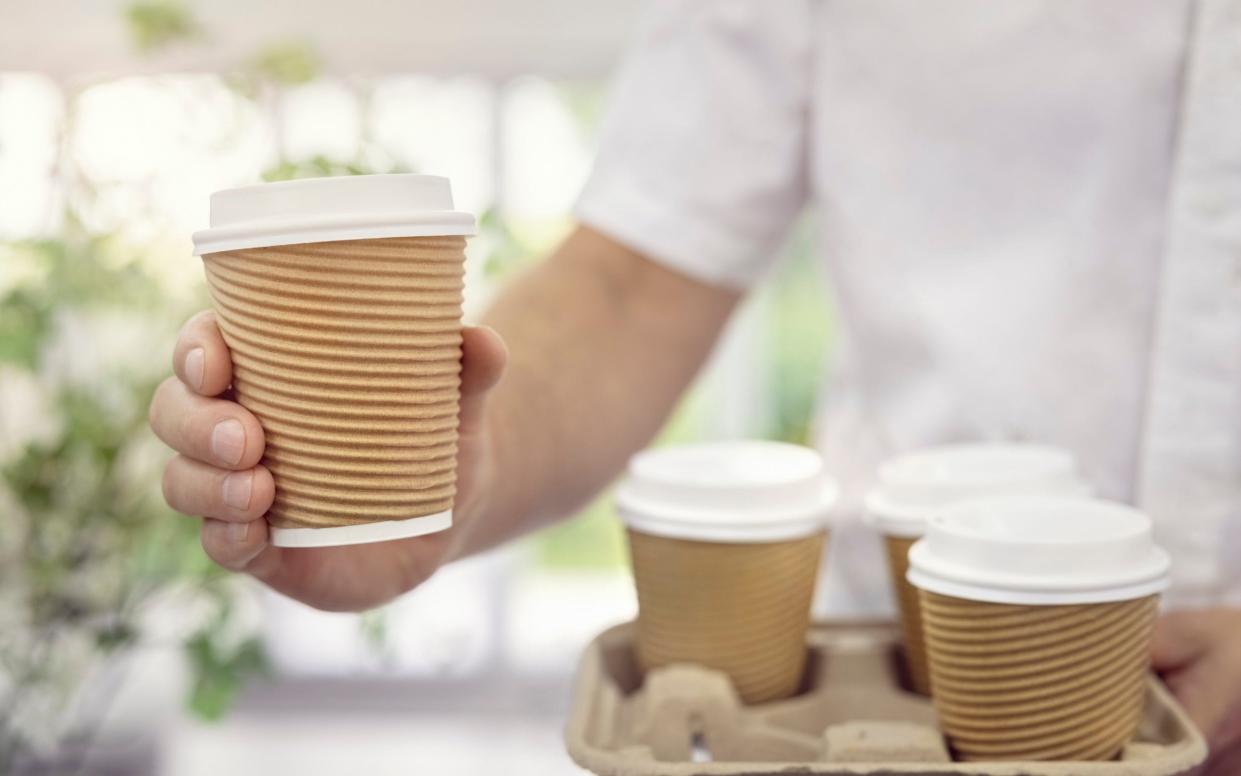Charge for coffee cups and wooden cutlery could be introduced to tackle ‘throwaway culture’

Takeaway coffee cups and disposable wooden cutlery could be the next products that come with an extra charge paid by customers under a little-noticed government legal change.
On Wednesday, ministers agreed to alter the definition in law of “single-use items” which could face charges, dropping an explicit reference to “plastic” products.
It means that the law which compels supermarkets to charge people 10p for a plastic bag could be applied in a similar way for non-plastic items.
It opens the door to people having to pay extra if they want to get a coffee in a cardboard cup or use wooden cutlery to eat takeaway food.
'Throwaway culture' sees 2.6bn coffee cups disposed of
Government figures told The Telegraph that the legal change was needed to help tackle a “throwaway culture”, given the wider drive towards more environmentally friendly practices.
But they stressed no final decisions had been taken about applying new charges, with a public consultation needed before any such move.
Britons are increasingly carrying their own reusable coffee cups, a trend the Government is keen to encourage.
But 2.5bn coffee cups are used and thrown away each year in the UK, according to estimates in a House of Commons Environmental Audit Committee report in 2018.
The move comes as Boris Johnson tries to drive forward a transformation of the economy to make the UK a net zero emitter of carbon by 2050.
‘Landmark piece of legislation’
More than 700 pages of government documents released on Tuesday outlined the most detailed plan yet for how the UK hopes to reach the climate change target.
Yet uncertainty remains about the scale of costs coming for households and businesses.
Government ministers argue the economic cost of inaction on climate change is far greater.
The change was made to the Environment Bill, which is going through the House of Commons, and followed an amendment backing the move from the House of Lords.
Rebecca Power, the parliamentary under secretary of state at the Department for Environment, Food and Rural Affairs, told the House of Commons on Wednesday: “Make no mistake that this is a landmark piece of legislation that will increase our resource efficiency and biodiversity, drive improvements in air and water quality, and put us on the sustainable trajectory for the future that I believe we all want and need.”
Success of plastic bag charges
In May, the Government increased the single-use carrier bag charge from 5p to 10p after success in driving down the number of plastic bags people use in the UK.
Before the 5p bag charge was introduced, an average household used around 140 single-use plastic bags a year, according to the Government. That has now been reduced to four.
The Government has already banned the supply of plastic straws, stirrers and cotton buds and banned microbeads in personal care products.
Earlier this year, it was also consulting on a new deposit return scheme for drinks containers, which would give people a financial incentive to recycle.
Next month, Glasgow will host the Cop26 UN climate change conference in what is seen as a major test of Mr Johnson’s leadership on the global stage.
World leaders will gather in an attempt to deliver on existing commitments towards green reforms and adopt more ambitious promises to slow global warming.
Nine countries miss Cop26 emissions deadline
Nine of the world's biggest emitters have missed the deadline for climate goals ahead of Cop26, Alok Sharma has admitted.
Just over a week before the landmark climate conference, set to be held in Glasgow, the minister told MPs that major countries including China and Saudi Arabia still had not submitted their plans to help cut global carbon emissions.
The G7, EU, South Africa and Argentina have all published updated contributions, while South Korea did submit a new target last year but did not set a more ambitious goal.

